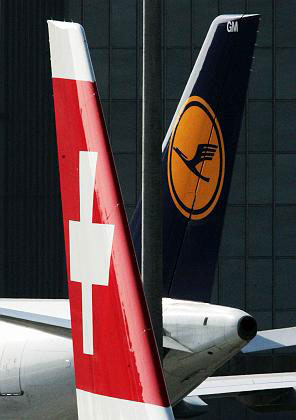

 |
 |
|
| |
||
 Lufthansa
Cargo and Swiss WorldCargo will not become one entity but stay separated and
maintain their different brand names as well as product portfolios.
Lufthansa
Cargo and Swiss WorldCargo will not become one entity but stay separated and
maintain their different brand names as well as product portfolios.
“There are a lot of important customers
in Switzerland that are eager to hand over their shipments to a Swiss airline
with the Swiss cross at their fleet,” stated Jean-Peter Jansen, head of
Lufthansa Cargo, in a recent meeting with German forwarders in Frankfurt.
“Our basic principle is not to touch the
heritage of Swiss.”
Jansen’s counterpart at Swiss Cargo, Oliver
Evans, lauded that promise:
“Retaining individuality means to accept
different cultures by both partners to give customers the chance to make a choice.”
At this point both carriers have opted to maintain
separate management in which to pursue individual business strategies while
maintaining their full financial autonomy.
Therefore, LH and LX do not follow AFC/KLM Cargo
model that has integrated most domestic and international activities, including
staff, products and stations.
“We are a niche player with no freighters
in our fleet but only belly hold space.
“Therefore, we want to further concentrate
on niche markets and retain our leadership as provider of belly hold capacity,”
said Evans.
Looking at the big picture, Lufthansa Cargo plays
a distinctly different role in the international airfreight arena.
Jansen and Evans thinking is that Lufthansa and
Swiss offering the market different business models will be able to foster deeper
relationships with agents and shippers unique to each carrier.


However, flying separately does not exclude Lufthansa/Swiss collaboration in
a number of fields.
One such playing ground is the European trucking network both Swiss and LH Cargo
offer their clients. “We are going to streamline the road feeder service,
because parallel transports do not make much sense and furthermore, they are
costly,” Mr. Jansen said.
Swiss WorldCargo wants to utilize the Lufthansa Cargo freighter fleet especially
on routes to Far East.
“The Lufthansa cooperation offers us additional capacity together with
a number of destinations we do not have in our network,” said Evans.
A third topic on the agenda of both carriers is the handling services at the
airports served by the two carriers.
Wherever possible they want to use a common ground handling agent in future.
Taking their consolidated tonnage into account both partners are ranked second
with 7.2% of the worldwide flown TKT.
Market leaders are AF/KL Cargo (7,9%) while Korean Cargo comes third (6,4%).
Due to the fierce competition and thin margins in the airfreight business both
Evans and Jansen predict the ongoing consolidation of the cargo carriers.
Especially for the European capacity providers this is a “question of
further survival” (Jansen), since carriers from Asia and the Middle East
could surpass their European competitors in a couple of years due to the extraordinary
economic growth in their home markets, political support and their aggressive
price policy.
“We shouldn’t passively wait until that happens,” Jansen suggests.
Heiner Siegmund